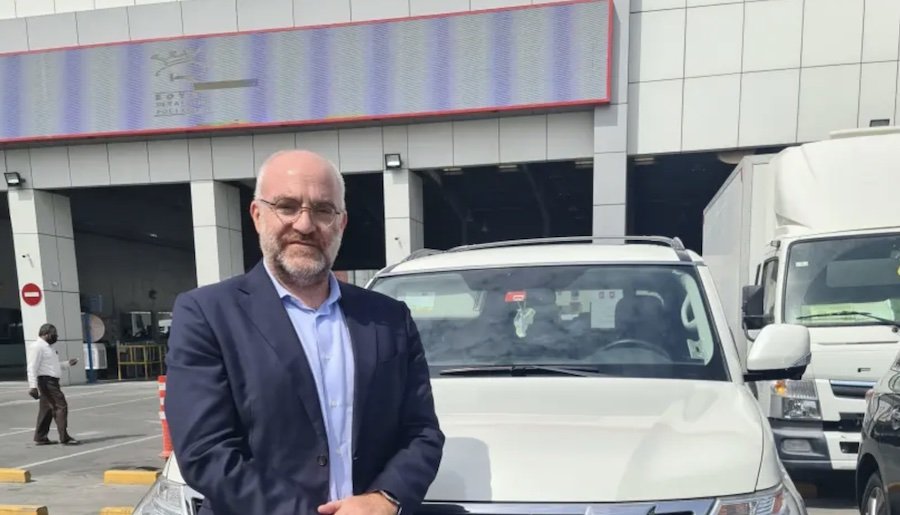Jewish Dubai resident embarks on UAE-Saudi-Israel road trip

August is the heavy tourist season in Israel, but two visitors arrived in Israel on Friday in a different way than anyone else: By car from the United Arab Emirates.
Bruce Gurfein and his friend Joe Koen embarked on a drive from Gurfein’s home in Dubai to Israel – starting on Sunday and stopping in Riyadh, Jeddah, Al Ula and Neom in Saudi Arabia, and Aqaba in Jordan – before making it to Jerusalem in time for Shabbat.
Before the trip, when Gurfein took his car to be inspected at Dubai’s Road and Transport Authority, he was told that he was the first person known to have ever driven to Israel on Emirati license plates.
During the rest of the 21-day trip, the Dubai resident also plans to visit Tel Aviv and Beersheba, go to the Palestinian Authority, visit more cities in Jordan and Saudi Arabia, and stop in Bahrain.
Why drive to Israel from the UAE?
When asked why he chose to drive to Israel from the UAE, Gurfein said, “I have been working in this part of the world since 1997 helping Israeli companies, especially in the UAE. For the last year-plus, I have been working on setting up an accelerator and incubator to help companies in food tech and desert agriculture tech move into the region.”
Among his recent projects was to help Israeli agri-tech companies enter the Saudi market.
Gurfein is CEO of Connect LLC in Dubai, which helps entrepreneurs enter the market in the Gulf. He decided to embark on his road trip with Koen, an agricultural professional, to promote those technological industries and cooperation between countries in the region.
While in Israel, he plans to meet with government officials, as well as hi-tech companies working in food and agriculture.
Throughout the road trip, Gurfein has been posting videos and photos online.
“I hope to show Israelis the amazing side of Saudi Arabia: the deserts, mountains and amazing history,” he said. “I’ve been traveling in Saudi Arabia for 20 years, and I still haven’t covered all the sites.”
At the same time, Gurfein hopes to “show my Emirati, Saudi and Iraqi followers another side of Israel and human interactions.”
Most of the responses he received in the region were positive, though he remarked, “There are always people you can’t talk to.”
Gurfein said he has an advantage in being deeply familiar with the culture in the Gulf – speaking Arabic, English and Hebrew, among other languages.
“More Muslim friends have been to my house for cholent for Shabbat lunch than Jewish friends,” he remarked.
In one case, Gurfein said, a Saudi man said to him, “We don’t want people like you shoving normalization [with Israel] down our throats,” referring to Israeli Channel 13 reporter Gil Tamary who visited Mecca despite a ban on non-Muslims entering the city.
At the same time, Gurfein hopes to “show my Emirati, Saudi and Iraqi followers another side of Israel and human interactions.”
Most of the responses he received in the region were positive, though he remarked, “There are always people you can’t talk to.”
Gurfein said he has an advantage in being deeply familiar with the culture in the Gulf – speaking Arabic, English and Hebrew, among other languages.
“More Muslim friends have been to my house for cholent for Shabbat lunch than Jewish friends,” he remarked.
In one case, Gurfein said, a Saudi man said to him, “We don’t want people like you shoving normalization [with Israel] down our throats,” referring to Israeli Channel 13 reporter Gil Tamary who visited Mecca despite a ban on non-Muslims entering the city.
Years in the works
The Dubaian responded by inviting the man to have coffee with him in Riyadh. The businessman also tweeted pointedly during his visit to Saudi Arabia that he followed all local laws, unlike Tamary.
Gurfein pointed out that trade between Israel and the UAE was built years before official normalization, which prepared the countries for peace.
“The flights from Tel Aviv to Amman and then Dubai were full of the same people – everyone knew it,” he recounted.
From Gurfein’s perspective, as someone who has long done business in Saudi Arabia, the time is not yet ripe for Israel-Saudi diplomatic relations.
“Anyone who really knows what’s going on in Saudi Arabia should hope there is no peace for another four or five years. With all the changes MBS [Crown Prince Mohammed bin Salman] has been making, if he adds one more thing, he’s going to fail,” Gurfein posited.
If Israel and Saudi Arabia make peace soon, “it will be like Jordan or Egypt, not like the UAE and Bahrain where there are real economic ties.”
Related News
